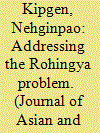| Srl | Item |
| 1 |
ID:
131247


|
|
|
|
|
| Publication |
2014.
|
| Summary/Abstract |
The simmering tension between Rakhine Buddhists and Rohingya Muslims in Western Myanmar escalated into a violent conflict in 2012, first in June and again in October. The violence led to the loss of over a hundred lives, destruction of thousands of homes, and the displacement of tens of thousands of people. The Myanmar government intervened to end the bloodshed but tension continues to linger. This article argues that, instead of alienating the Rohingyas politically, consociational democracy should be pursued to address the problem. The support and cooperation of both Buddhists and Muslims, and perhaps assistance from a neutral organization like the United Nations, would help achieve a political solution.
|
|
|
|
|
|
|
|
|
|
|
|
|
|
|
|
| 2 |
ID:
116892


|
|
|
|
|
| Publication |
2012.
|
| Summary/Abstract |
It has become common to regard consociational democracy as a method of managing conflict in ethnically divided societies but little attention has been paid to its applicability to societies where the primary political cleavage is between secular and religious forces. This article seeks to redress this imbalance by examining the applicability of consociationalism to the case of the Palestinian Territory. We argue that, while Palestinian society is characterised by 'pillarisation' along a secularist/Islamist cleavage, formal power-sharing between the representatives of the two main Palestinian factions, namely Fatah and Hamas, has proved elusive. However, rather than seeking to explain the seeming inability of the factions to share power by reference to the nature of the cleavage, as other authors have done, we instead highlight the contextual factors that have made power sharing difficult to achieve, namely the difficulties Hamas and Fatah face in accepting each other as political partners, and opposition from external actors.
|
|
|
|
|
|
|
|
|
|
|
|
|
|
|
|